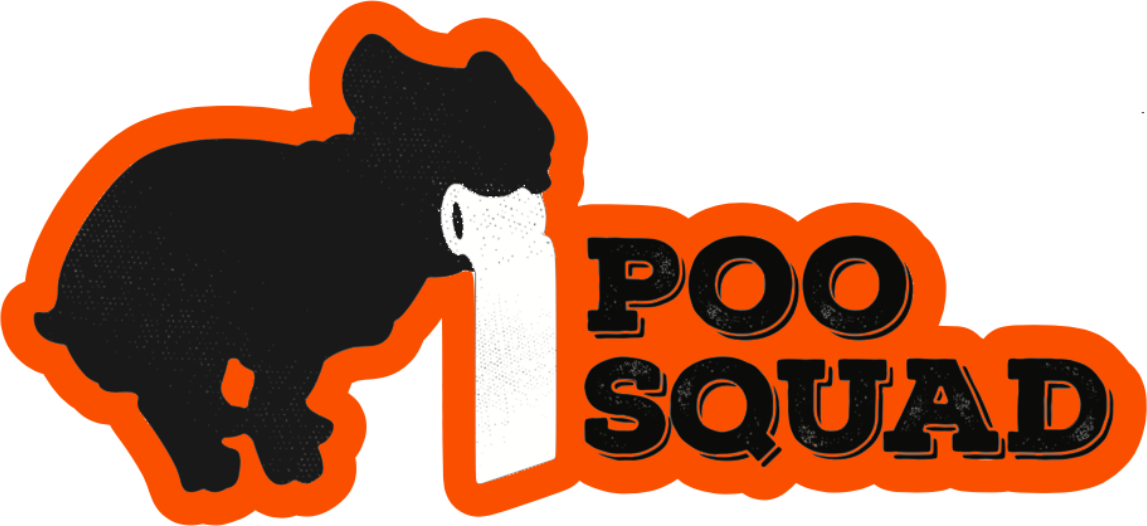Dogs eat rabbit poop due to instinct, curiosity, or nutritional gaps. While occasional ingestion is usually harmless, repeated or obsessive behavior may signal boredom, dietary deficiency, or compulsive tendencies.
Rabbit droppings can contain parasites like coccidia or Giardia, which may cause vomiting, diarrhea, or lethargy, especially in sensitive dogs or when consumed in large amounts. The habit is more common in spring and summer, particularly in yards with active rabbit populations.
To stop a dog from eating rabbit poop:
- Use commands like “leave it” with consistency during supervised yard time.
- Block access to areas where rabbits drop feces; clean shaded corners and brush.
- Upgrade diet with enzyme-rich or B-vitamin–balanced food.
- Add stimulation through toys, walks, and structured play.
- Track patterns to identify environmental or behavioral triggers.
- Call a vet if symptoms like GI distress or lethargy occur.
This guide explains causes, health risks, and step-by-step prevention, ideal for pet owners dealing with repeat behavior or seasonal spikes in rabbit activity.
Is It Normal for Dogs to Eat Rabbit Poop?
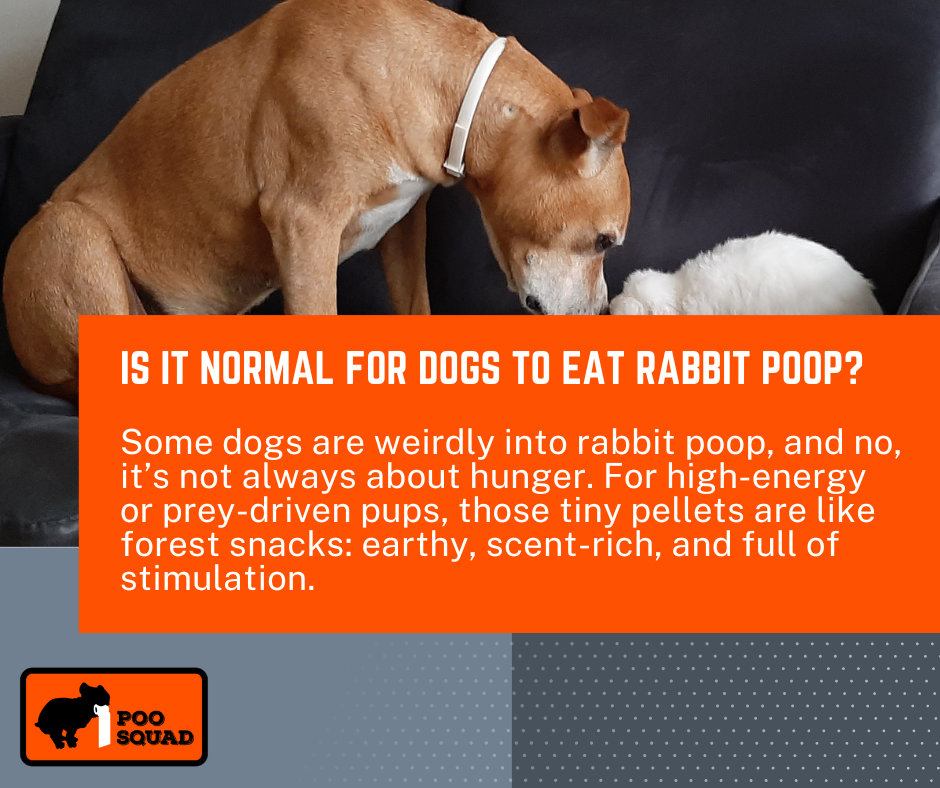
Many dogs explore the world through their mouths, and rabbit poop, oddly enough, checks all their boxes. It’s small, earthy-smelling, and surprisingly appealing. While the behavior is not uncommon, it can become obsessive if not addressed early. Understanding what’s driving your dog’s interest is the first step toward managing it.
In our experience, it’s often the pups with strong prey instincts or high energy levels that become fixated on rabbit droppings. They’re not necessarily hungry or deprived; they’re dialed into the environment in ways we often overlook. For dogs, those little pellets aren’t waste; they’re clues, snacks, and sensory input all rolled into one.
Some pet owners even report that their dogs act excited or proud after eating it. Others are baffled because one dog in the household is obsessed while the others won’t touch it. That kind of inconsistency usually points to individual quirks or learned behavior, not a universal issue.
We’ve noticed it tends to spike in spring and summer, especially in yards near greenbelts or parks, where rabbits are more active. If you’re in a neighborhood where wild rabbits pass through regularly, your dog may simply see their droppings as part of the landscape, and a tempting one at that.
If you’re already scooping regularly or using a yard sanitation and deodorizer service, you’re one step ahead. But if the habit is starting to feel more than occasional, it’s time to dig deeper into what might be driving it.
Is Rabbit Poop Dangerous for Dogs?
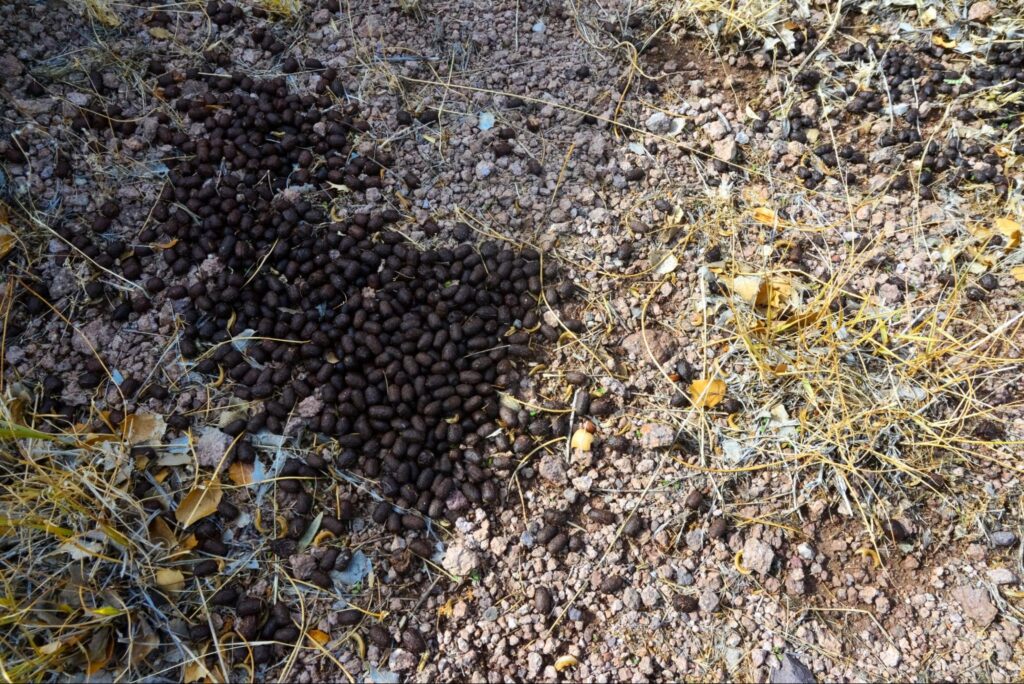
Rabbit poop is mostly made up of digested plant matter, so it’s generally not toxic to dogs. But that doesn’t mean it’s risk-free. In some cases, it can carry parasites or bacteria that upset your dog’s stomach, or worse, lead to infections that require a vet visit.
We’ve seen both ends of the spectrum. Some dogs eat rabbit droppings with zero side effects, while others end up with loose stools, vomiting, or sudden fatigue. The difference often comes down to:
- How much was eaten?
- How fresh the droppings were,
- and whether your dog has a sensitive digestive system.
While it’s rare, parasites like Giardia or coccidia can occasionally be passed through rabbit feces. Many of these are species-specific, but if your dog’s immune system is already compromised, or they consume a large quantity over time, it increases the risk.
One of the biggest problems is that rabbit poop often goes unnoticed in yards. It hides in shaded corners or under decks, and because it doesn’t smell strongly, it’s easy to miss. That’s where our trained scoopers make a real difference. We’re not looking for dog waste only; we’re keeping an eye out for foreign contaminants that could affect your pet’s health.
And if your dog is eating fresh droppings regularly, that ups the risk. Fresh poop is more likely to contain live bacteria or parasites. If you’re noticing:
- lethargy,
- digestive upset,
- or changes in appetite,
It’s worth consulting your vet right away.
Helpful Resource -> Backyard Animal Poop Identification Guide
Why Is My Dog Obsessed With It?
Some dogs try rabbit poop once and move on. Others seem fixated, like they’re on a mission. That level of obsession usually means there’s something deeper going on. Whether it’s boredom, diet, or behavioral habits, understanding the “why” is key to changing the behavior.
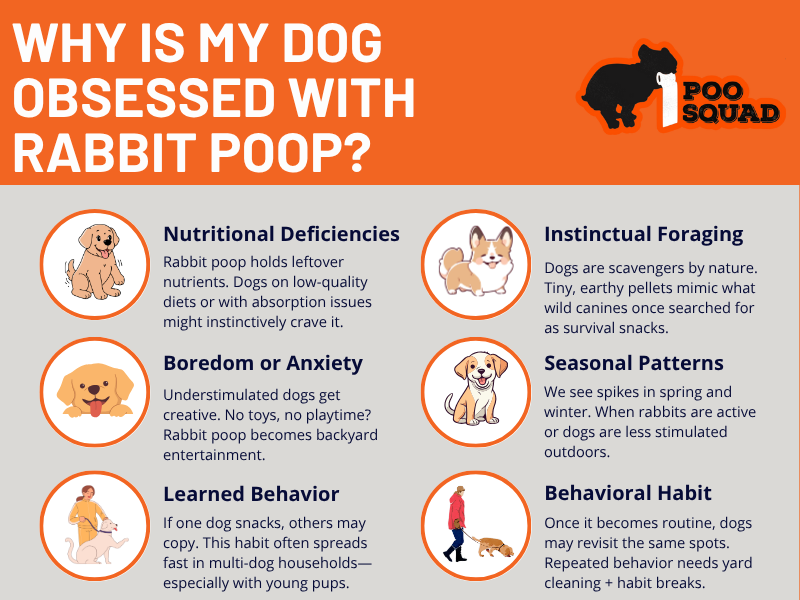
Nutritional Deficiencies
One common theory is that dogs may be trying to self-correct a lack of digestive enzymes or B vitamins. Rabbit poop contains partially digested grass and nutrients, which can appeal to dogs on lower-quality kibble or those not absorbing nutrients well. It’s not always about hunger; it could be about instinctively balancing what their body needs.
We’ve spoken to customers who upgraded their dog’s diet and saw the behavior disappear. In other cases, it helped reduce the frequency but didn’t stop it altogether. If you’re seeing this in a dog that’s also eating dirt or grass, it may be worth asking your vet about dietary gaps.
Boredom or Anxiety
Many cases come down to a lack of stimulation. Dogs left alone in the yard too long, or without toys or structured play, often find their entertainment. And unfortunately, that sometimes means eating what they shouldn’t. The behavior tends to spike during the winter, when dogs are cooped up and outdoor time becomes less predictable.
That’s one reason why our automated reminders and scheduling tools help customers manage consistent outdoor routines, not only for cleaning, but for behavioral awareness too.
Learned Behavior
It’s also possible your dog picked it up from another pup. We’ve had clients with multi-dog households where one starts the trend and the others follow. That’s especially common in younger dogs who learn habits through mimicry. If one dog is grazing regularly, the others may assume it’s worth checking out.
Instinctual Foraging
Lastly, it could be hardwired. Dogs are scavengers by nature. Their ancestors didn’t waste nutrient sources, even if they were partially digested. Combine that with rabbit poop’s size and texture, and it’s like a snack-sized temptation that ticks all their evolutionary boxes.
If your dog is routinely “hunting” for these droppings in the same corners of the yard, it may be time to create boundaries or clean those areas more frequently. Small changes like these can disrupt the pattern before it becomes a deeply rooted habit.
What Are the Signs It’s a Problem?
An occasional nibble might not be cause for alarm, but if your dog is actively seeking out rabbit poop and ignoring your commands, it’s time to pay closer attention. Repeated, obsessive behavior can signal deeper issues like anxiety, compulsive tendencies, or health concerns.
We’ve seen it firsthand during routine service stops: dogs who dart to the same corner every visit, nose to the ground, tail wagging like they found gold. If your dog is ignoring meals or treats in favor of droppings or shows visible distress when stopped, that’s not normal curiosity; it’s compulsion.
Other red flags include:
- Ignoring “leave it” or recall commands
- Changes in appetite or mood
- Stomach problems shortly after grazing
- Grazing even on walks or unfamiliar yards
We’ve even had customers ask whether they should use a muzzle during yard time. While that might prevent the behavior temporarily, it doesn’t address the root cause. If this sounds familiar, it might be time to think about whether your yard is providing enough stimulation or too much access.
This is where regular service can help. Our techs often alert customers when they see recurring behavior patterns, like a dog making a beeline for a certain shaded patch. Because we’re in your yard weekly, we’re in a unique position to help you notice these trends early.
How to Stop a Dog from Eating Rabbit Poop
If your dog’s fascination with rabbit poop is more than a passing phase, it’s time to take action. The solution is not always one-size-fits-all, but with the right mix of training, environment management, and dietary support, you can break the cycle before it becomes permanent.
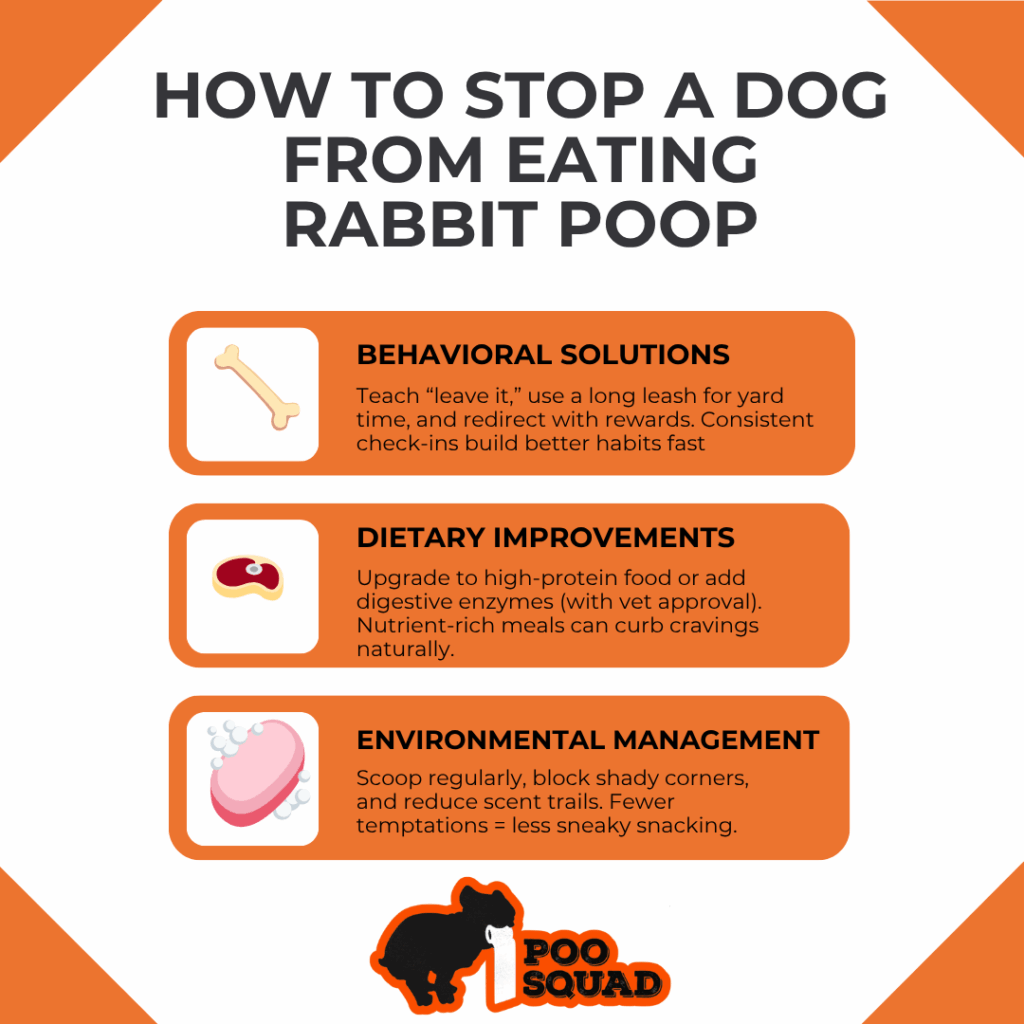
Behavioral Solutions
The most effective place to start is with basic commands. Teaching “leave it” or redirecting with treats can stop the behavior in the moment, but consistency is key. A long leash during supervised yard time allows you to correct behavior quickly without confrontation.
Customers often ask why their dog only eats it when they’re not looking. The truth is, once it becomes a habit, dogs get sneaky about it. One of our clients started training her pup to check in every few minutes in the yard, problem was solved. Sometimes the fix is that simple.
If you’re dealing with a serial snacker, you might also want to consider blocking off certain corners of the yard. Rabbits tend to favor shady, low-traffic areas, and your dog probably knows where those are better than you do.
Dietary Improvements
For dogs with a nutritional motive, upgrading their food can make a huge difference. Foods that are rich in B vitamins and enzymes tend to satisfy those cravings internally. We’ve had clients switch to raw or high-protein diets and see a drop-off in poop-eating behavior within weeks.
Supplements like digestive enzymes can also help, especially in dogs with absorption issues or chronic gastrointestinal problems. Be sure to check with your vet before adding anything new.
Environmental Management
One of the easiest ways to reduce temptation? Make sure the poop’s not there to begin with. That means keeping up with yard maintenance, especially during spring and summer when rabbit activity spikes. But not everyone has the time (or the stomach) to do that regularly.
Our yard sanitation and deodorizing services don’t clean up the obvious messes only; they help reduce scent trails and prevent recurring hotspots where rabbits tend to linger. The fewer temptations in the yard, the easier it is to break the behavior.
One customer even told us our weekly service was the reason she no longer had to supervise every backyard visit. Her dog stopped searching, and she got her peace of mind back.
When Should You Call the Vet?
Most of the time, dogs eating rabbit poop is not a crisis. But when the behavior becomes obsessive or your dog starts showing symptoms, a vet visit can help rule out bigger issues. Trust your gut; if something feels off, it’s better to check early than to wait.
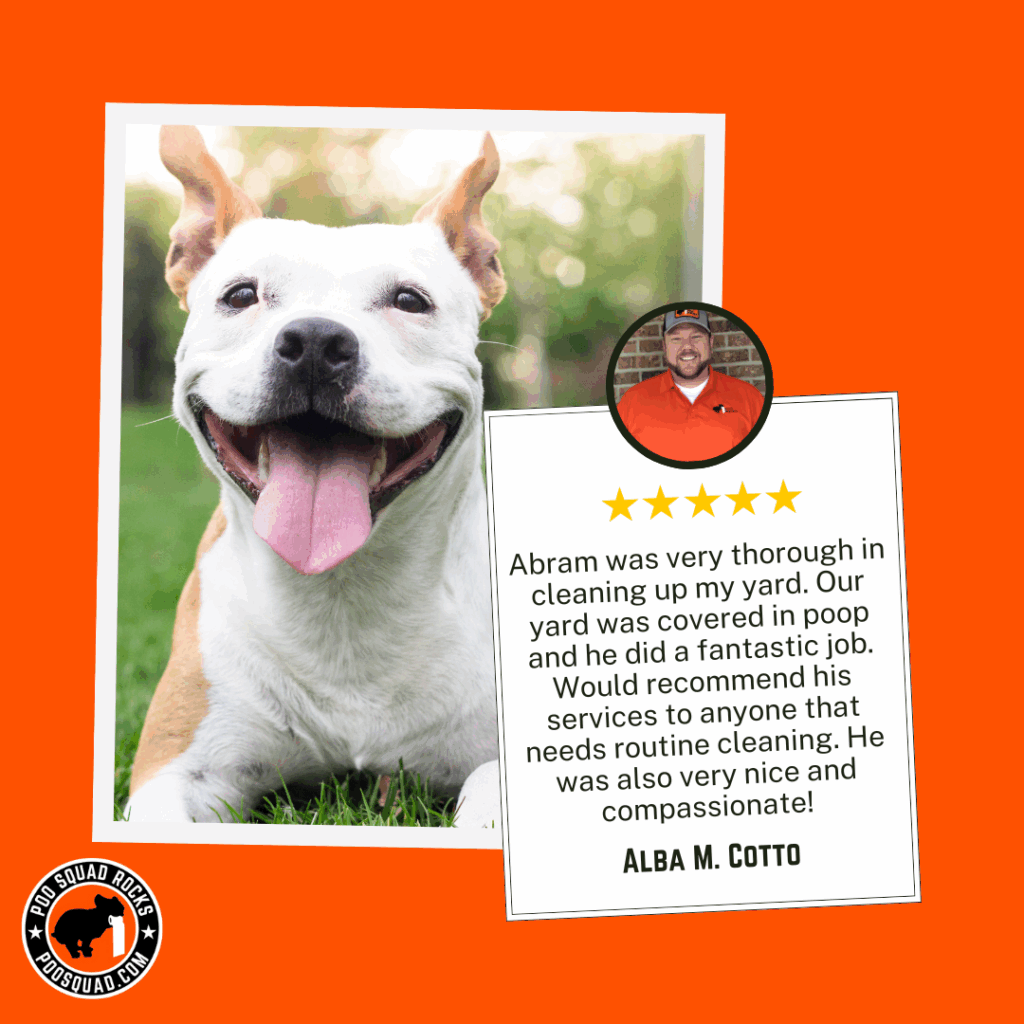
Look out for signs like:
- Vomiting or diarrhea within 24 hours of eating poop
- Sudden lethargy or loss of appetite
- Frequent poop-eating despite training or dietary changes
- Unexplained weight loss or behavior shifts
We’ve had customers share stories of dogs who ate droppings without issue for months, until one day they didn’t. That’s why we recommend keeping an eye on patterns. If your dog is suddenly more aggressive about the behavior or starts grazing more often, that could signal an infection, parasite exposure, or even a metabolic imbalance.
It’s also worth checking if your dog is eating other odd things, like grass, dirt, socks, or toys. These behaviors may point to pica, a condition where dogs compulsively eat non-food items. That’s not something most owners can solve without professional input.
And if you’re unsure, a simple fecal exam can often rule out parasites or help catch something early before it escalates. Peace of mind is always worth the appointment.
Ready to Break the Rabbit Poop Obsession?
If your dog has turned rabbit droppings into a daily ritual, it’s not something to ignore. From diet tweaks to behavior training, you’ve got tools, but consistency and clean environments make the biggest difference. And if you’re ready for backup, we’re built for this kind of mess.
Our weekly visits don’t handle the obvious stuff. We help families reclaim their yards, reduce hidden health risks, and spot habits you might never notice otherwise. If your dog’s behavior is starting to feel like more than a phase, it might be time to get help from people who’ve seen it all.
We’re already in your neighborhood. Let’s reclaim your yard and your sanity, starting this week.
Schedule your first poop scooping service today and discover why so many pet owners trust us to help with more than only cleanup.
Frequently Asked Questions
Is rabbit poop more dangerous than dog poop?
In general, rabbit droppings are less risky than dog feces. They contain fewer zoonotic pathogens and are made up mostly of digested plant matter. Still, there’s always a chance of parasites or bacteria, especially if your dog eats a lot of it regularly.
What’s the difference between rabbit cecotropes and regular poop?
Cecotropes are nutrient-rich droppings rabbits produce and eat themselves. They’re softer, smellier, and packed with enzymes. Most dogs are drawn to the hard pellets, but if they’re after cecotropes, the behavior may be even more nutrient-driven.
Is rabbit poop from pet rabbits safer?
It’s a bit safer, since indoor rabbits are less likely to be exposed to parasites. But even then, bacteria or contamination could still be present. It’s best to discourage the habit either way.
Could it be something besides rabbit poop?
It’s possible. We’ve seen situations where dogs were eating mower-chopped dog poop, decaying plants, or even wildlife droppings, and owners thought it was rabbit poop. If in doubt, take a closer look or snap a photo for your vet.
Why does only one of my dogs do this?
Every dog has its quirks. Some may have higher prey drive, more anxiety, or learned the behavior from another source. It doesn’t mean something is wrong with your other pets; it means this dog has a different instinct or trigger.
